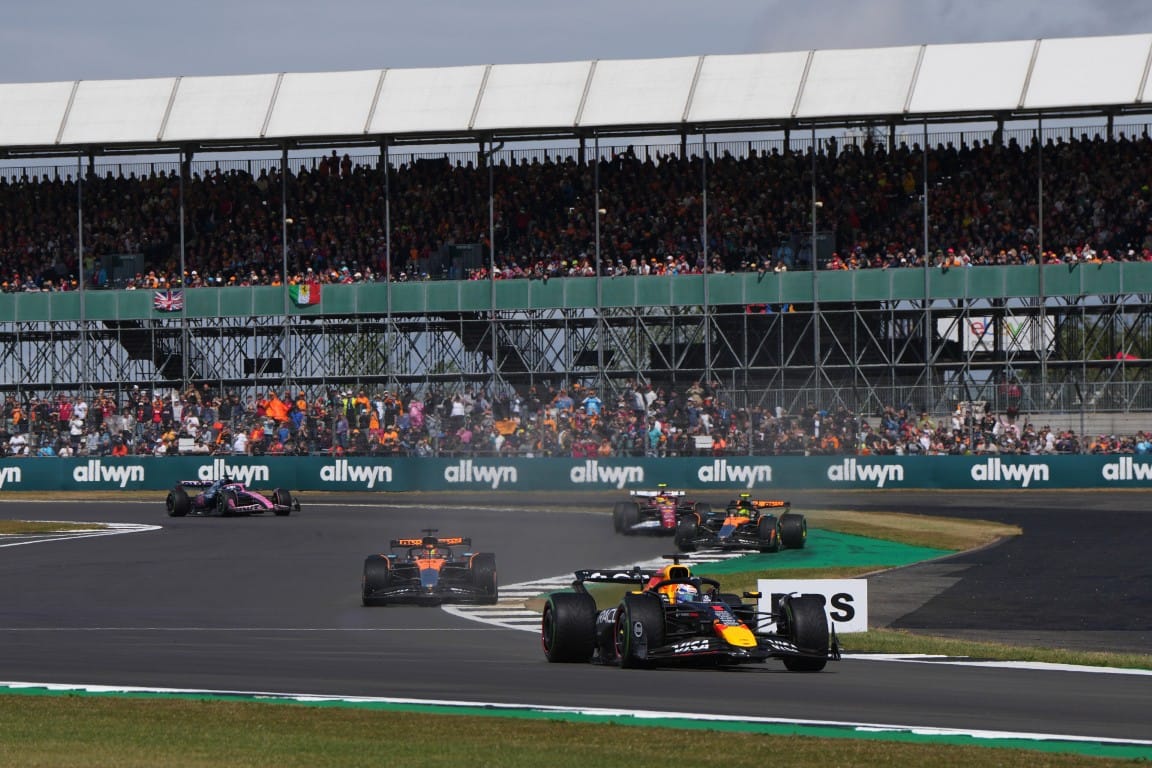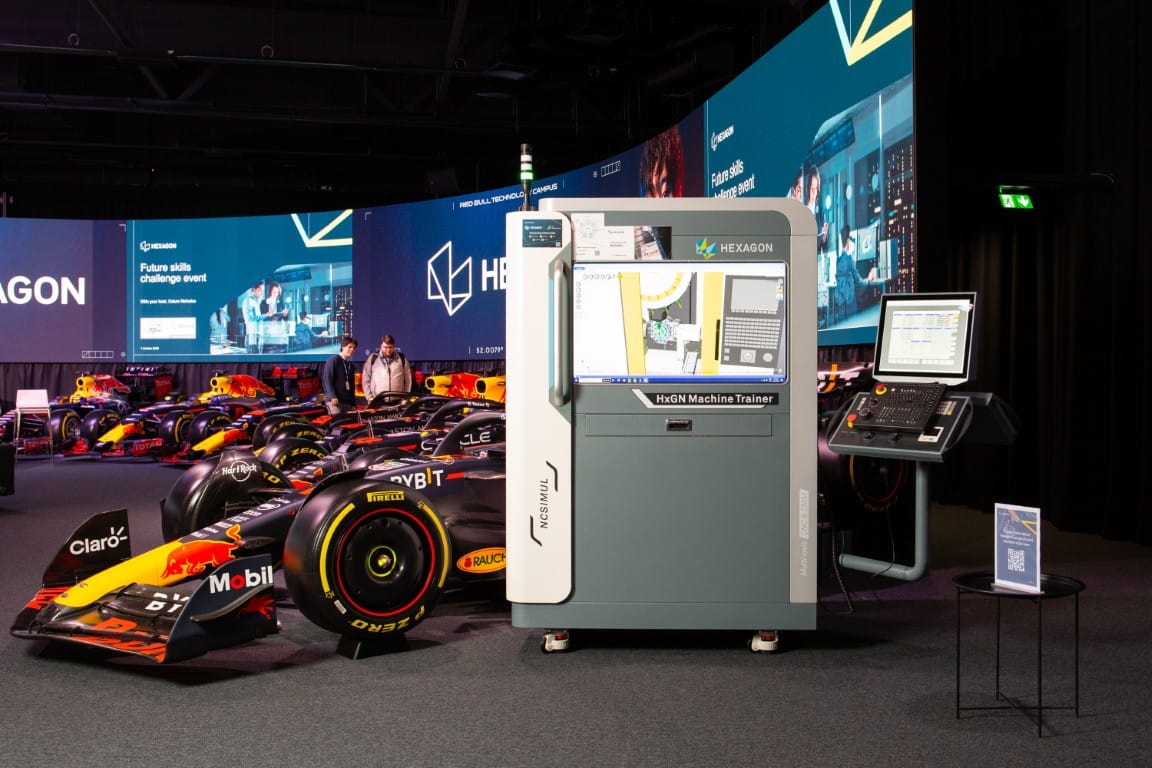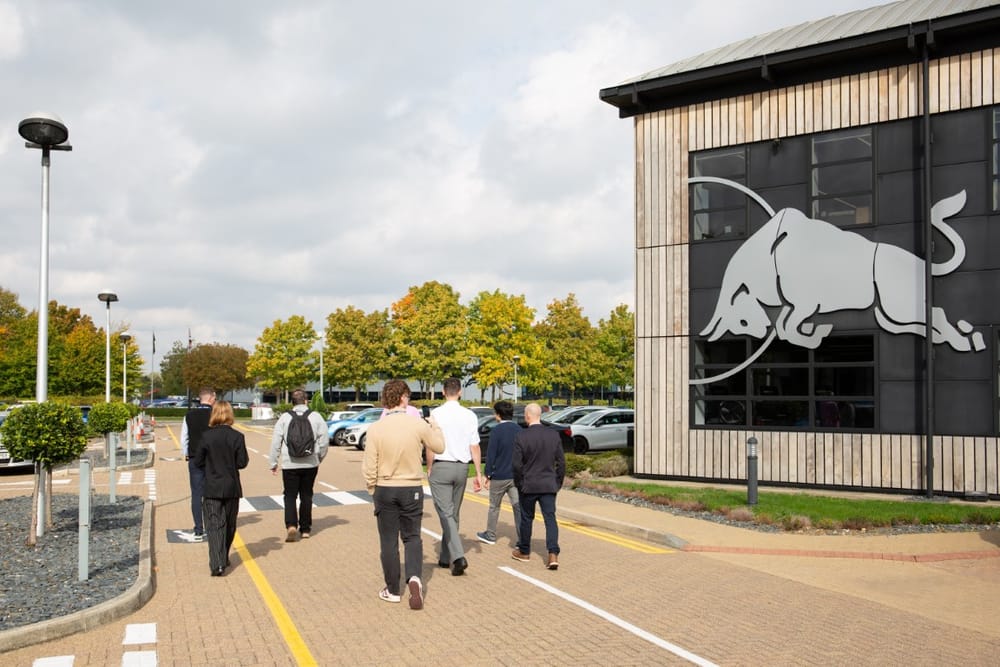The booming popularity of Formula 1 and the prestige of being a part of a multiple world championship-winning F1 team should make recruitment for leading F1 teams like Red Bull easy, right?
Think again - as there’s a very real skills shortage gap that can make filling key positions tricky for F1 teams.
The Race headed to Red Bull’s Milton Keynes campus - which recently expanded to include a Powertrains division for the very first time - to better understand why there’s an unexpected recruitment challenge for Red Bull and its key technical partner Hexagon.
An unexpected shortage
Ask any fan (or journalist) to name as many members of any given F1 team as they can and they’ll probably struggle to get into double digits.
But there are thousands of people working for F1 teams. In fact, Red Bull Racing and its associated Technology division employ over 2,000 people on its Milton Keynes campus - there’s no wonder finding an on-site parking space can be one of the biggest challenges.
Fewer than 10% of that workforce will go to every F1 race, but much of the success of the car on track is influenced by the work done by the other 90%.
But finding people to fill those diverse sets of roles is difficult - don’t forget F1 cars are made up of thousands of different components, and making some of those components can require an incredibly niche set of skills.
There’s a real skills shortage in some departments that can complicate recruitment, even for Red Bull, despite its multi-world championship-winning status.
That’s a problem being tackled by the likes of Sophia Heath, an engineer with electric car company Polestar before she joined Red Bull’s recruitment department as a technical recruitment engineer.
“I think what people don't see on the TV is that actually it's not just a driver, it's the people on a pit wall, it's the mechanics in the garage. But there are about 2,000 people here who work at Oracle Red Bull Racing now, and we design, manufacture and assemble everything you see on the car here, and it's built here,” Heath explained.
“It's kind of really cool because there's not really another industry, even the automotive industry in the UK really, where you can say everything was made, built and assembled in the UK.
“It's one of the niche things about motorsport and what makes the UK kind of a global leader in it.
“But shockingly, despite how cool all of this is and how cool it seems on the TV and how global the sport is, we do actually struggle to fill roles and we struggle to get talent.
“And one of the areas where we do struggle is manufacturing. A lot of what we make and a lot of what we build is very niche to us.
“There are 10 teams out there now - 10 teams all employ people who have the skills they need to manufacture and build our cars.
“We can't all have the same people all the time. So it's going out and finding people with other skills that are able to fill those roles.”
Heath explained part of the problem is the decline in the UK automotive and motorsport industry, as it’s shrunk from a 17% share of GDP in 1990 to around 9% by 2024.

Plus, the COVID pandemic meant apprenticeship schemes for under-19s, where a lot of our manufacturing roles come from, dropped by 66% as young people opted for university instead.
“I think the pandemic has really caused a gender gap, especially in younger people, for these hard skills - the skills that we need to build stuff, to manufacture stuff, to assemble stuff - that was because simply we couldn't go out and see anyone,” Heath added.
“It's probably part of the reason why a lot of kids got into simracing and video games and stuff behind a computer, because we simply weren't allowed to talk to each other and communicate and connect with each other.
“So a lot of people sought opportunities at university because it's a safe option. It just meant that those who have hard skills - we struggle to find them, essentially.
“We manufacture a lot of bespoke niche stuff and when you have people who are sort of nearing retirement knowing these skills - and then you don't really have a younger generation coming through having them, it's really difficult.
“It’s been a hard time for us from that perspective. And then, again, it all ties back into the thing of 'if we don't manufacture, we don't go racing, and we don't win championships', you know? We need to build the cars and we need to go out racing. So, where does that leave us really?
“Well, it means that we, as a global leader in the industry, we need to do something different when it comes to recruitment and finding skills in people.”
8 months to fill a role

Red Bull is building its own F1 engines for the very first time ahead of the new-for-2026 power unit regulations.
That’s meant a mass recruitment drive, with Red Bull Powertrains signing plenty of staff from existing engine manufacturers - as well as from outside the industry.
“Probably in the electronics world. It’s very niche,” Heath said when asked where the biggest skills shortage was.
“On the powertrains side of things, we’re manufacturing all of our own batteries and that kind of stuff.
“That’s a very niche role to fill, I’ve been trying to fill that role for the past eight months.
“It’s those niche roles, where you wouldn’t think there would be an application for it…you’d never think Red Bull would need a battery chemist.
“You’d never think we’d need someone who can do with high voltage conversion, most people think OEMs and electric cars for that, but we do deal with those high voltages as well.
“Another thing we really struggle is that these jobs are not attractive to kids.”
What Red Bull’s doing to fix it
‘Unicorns.’
That’s part of the solution that Red Bull has found, along with its technical partner Hexagon - a Swedish-based manufacturing company that specialises in the kind of precise measurements that are crucial in F1.
No, they aren’t talking about employing mythical beings to solve the skills shortage, but it’s all about looking at non-traditional areas to fill motorsport roles.
Heath gives the example of a young man who was a blacksmith before being recruited by Red Bull and a young woman who was a nail technician who was able to transfer her attention-to-detail skills to making wiring harnesses that are crucial for keeping wires in place within a car.
Simracing is also fertile ground for future F1 talent, not just behind the wheel as the likes of simracing world champion Sebastian Job have shown with his F1 test and his important behind-the-scenes F1 simulator work, but in terms of engineering talent, too.
Red Bull’s simracing division and Hexagon worked with MENSA to create a global competition, the ‘Future Skills Challenge’, which tasks entrants with completing an interactive quiz of rapid-fire, data-driven scenarios that tested their instincts and real-world engineering problem-solving capabilities.
The challenge partly showed the link between the skillset of simracers and next-generation engineers.

Spanish software engineer Antonio Masuda - a data science master’s graduate - won the competition, with runner-up prizes awarded to Kyle Tunstall, a Network Rail roster clerk and Sebastian Kowalke, former F1 Esports head of engineering, race engineer, and race strategist.
“The winners of the Future Skills Challenge have shown the high-performance mindset we need for the next generation of engineering talent - the ability to work with data, think strategically, make decisions under pressure, and embrace technology,” said Alexandre Aime, vice president of global marketing at Hexagon.
“It’s exciting to see the talent pool that is emerging, equipped with hybrid skillsets that matter in both simracing and engineering.”




